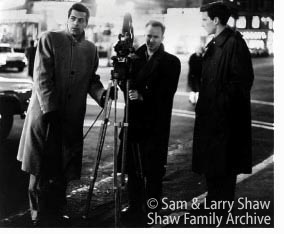|
 There
were three of us in one room … going around looking for jobs
… I didn't do too well … My first real job wasn't until
years after I graduated. I spent years making the rounds by day,
and chasing women and liquor at night … Since none of us had
any money, we had to use our wits. We had to get girls to give
us
their apartment, come in and cook for us, bring food over. We found
that trying to get along with actresses who are broke too is no
good. We had to go out and find people who weren't actresses – airline
hostesses, women who worked in grocery stores, who could pick up
some groceries for us. We had to find librarians, to get a better
book collection, and stuff like that. We had a wonderful time. I
couldn't wait for the next day to come, so I could get involved
with some new girl and promise to marry her and then stop seeing
her. In those days, I promised to marry just about every girl I
took out. I felt if that's what they wanted to hear, that's what
I'd tell them. Maybe it was dishonest, but at the time it didn't
seem so. There
were three of us in one room … going around looking for jobs
… I didn't do too well … My first real job wasn't until
years after I graduated. I spent years making the rounds by day,
and chasing women and liquor at night … Since none of us had
any money, we had to use our wits. We had to get girls to give
us
their apartment, come in and cook for us, bring food over. We found
that trying to get along with actresses who are broke too is no
good. We had to go out and find people who weren't actresses – airline
hostesses, women who worked in grocery stores, who could pick up
some groceries for us. We had to find librarians, to get a better
book collection, and stuff like that. We had a wonderful time. I
couldn't wait for the next day to come, so I could get involved
with some new girl and promise to marry her and then stop seeing
her. In those days, I promised to marry just about every girl I
took out. I felt if that's what they wanted to hear, that's what
I'd tell them. Maybe it was dishonest, but at the time it didn't
seem so.
What the actors had
no way of knowing was that the characters were also based on
Cassavetes'
life. Each of the major characters was a version of himself – in
both deep and superficial respects: Tom's tirade about colleges
and professors embodied Cassavetes' own attitudes toward higher
education. Ben's disenchanted drifting with his two buddies
mirrored
Cassavetes' own years of street fights, carousing, boozing and
skirt-chasing with his two roommates in the early 50s. His love-hate
dependency
on Hugh was modeled on Cassavetes' rivalry with his elder brother,
Nicholas, who was a lot like Hugh and bailed Cassavetes out
financially
many times in his early years.
Hugh's inability to
get a decent job and his feelings about the indignity of the
ones that
were offered to him echo Cassavetes' own situation before he got
his big break. In fact, in 1953 at an audition at the Hudson
Theater
(a burlesque house), he had had to introduce a girlie line and
sing "A Pretty Girl is Like a Melody" and had been, in his own
words,
"humiliated" by the result. A few bars into the song, he was told
to shut up and get off the stage.
Hugh also represents
a side of Cassavetes from closer to the time that Shadows
was made. As his career was finally coming together in the mid-
and late 50s, Cassavetes felt overwhelmed by requests from friends
to help them get jobs or meet important people. Like Hugh, after
doing dozens of "favors" for friends, he would occasionally feel
resentful of the demands placed on him and explode with anger and
frustration.
Other characters and
themes in the film echo Cassavetes' feelings in less specific
ways.
Rupert's and Hugh's faith in the importance of friendship and Lelia's
endearing impulsiveness are reflections of aspects of Cassavetes'
personality. Though it was downplayed when the film was re-edited,
it is also biographically significant that the first version
of
Shadows focused much more heavily on the idea that Tony
"stole" David's girlfriend from him, which tied in with Cassavetes'
personal
streak of jealousy and envy in romantic affairs.
More important than
these specific references, the idea of "passing" represented
Cassavetes'
view of his own situation at this point in his life. As strange
as it might sound, Cassavetes thought of himself as being a
lot
like Lelia and Ben. As the young ethnic actor making his way among
New York's artistic movers and shakers in the late 50s, he felt
himself to be an impostor in a world he was not part of and was
not comfortable within. He felt he was "passing" for something
that
was not necessarily a reflection of his truest, deepest identity.
Shadows, Published
by the British Film Institute (London, England)
Distributed in America by
the University
of California Press at Berkeley
ISBN: 0-85170-835-8
88 pages; thirty illustrations
This
page only contains excerpts and selected passages from Ray Carney's
writing about Shadows. To obtain the complete text as well
as the complete texts of many pieces about Cassavetes that are not
included on the web site, click
here.
|









